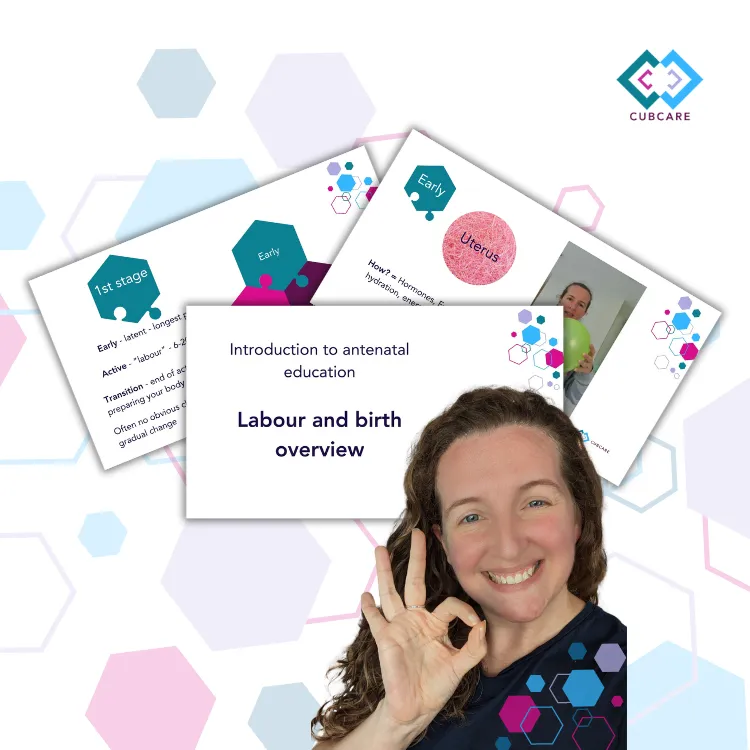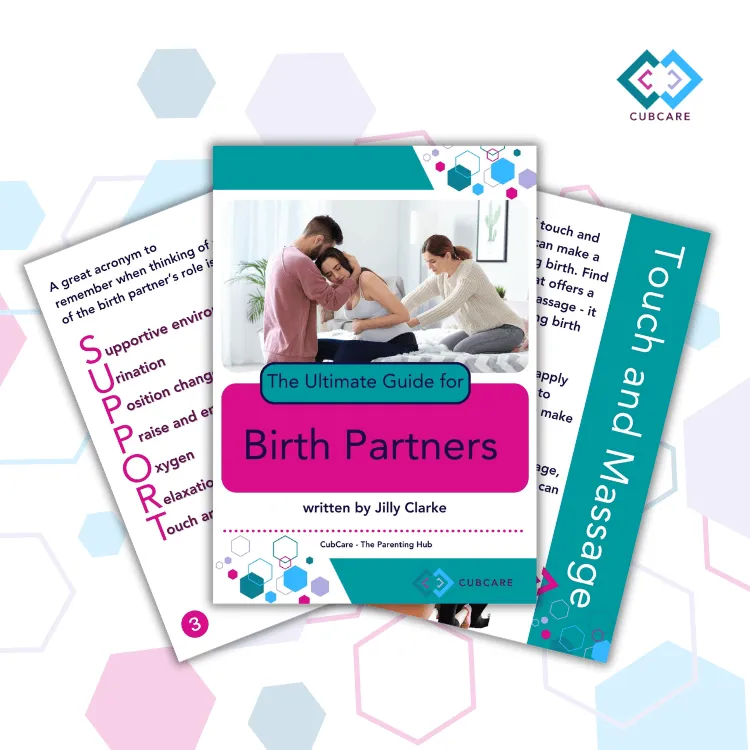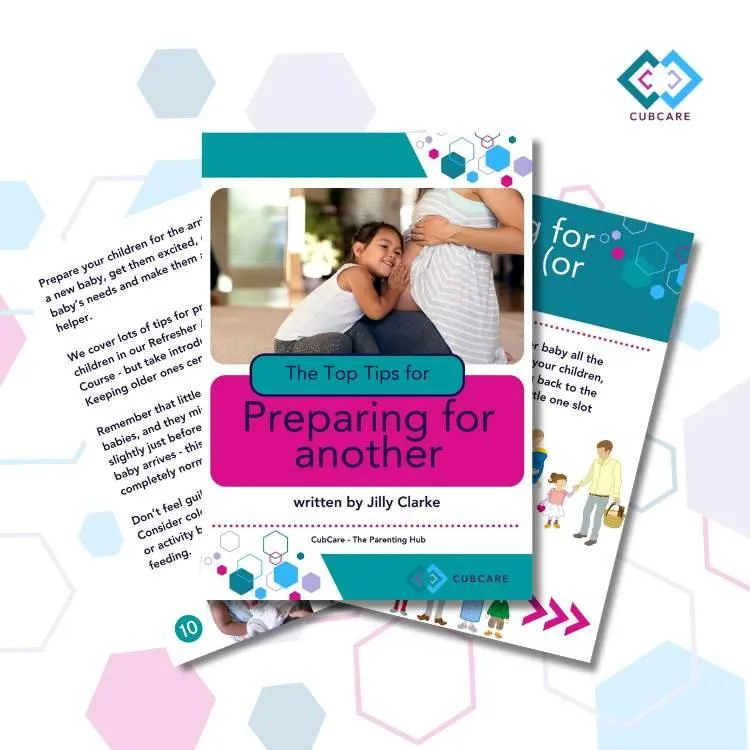We're an award winning Antenatal and Postnatal Education Platform 2025!
(read more here)
CubCare blogs.
From early pregnancy to newborn development.
Advice to help through pregnancy, birth and childhood.
BLOG

The silent partner problem: why birth partners need to step up — and how preparation changes everything
"A great birth partner is tuned in. Steady. Kind. Practical. Proactive without being overbearing. You notice small shifts and respond with quiet confidence. You protect privacy when it matters. You remind your partner to drink, to change position, to breathe. You create safety in a system that doesn’t always prioritise it." - Jilly Clarke
The NHS Birth system doesn’t prepare you — but you can prepare yourself as a Birth Partner
The NHS is under enormous pressure. Antenatal education is inconsistent, often reduced to a few short sessions or online leaflets. Partners rarely receive dedicated guidance. They’re told to “be helpful” but never shown what that looks like.
So many do what they think is best — they sit quietly, stay out of the way, and assume the professionals will handle everything.
But the best birth experiences happen when everyone in the room plays their part.
Midwives handle the clinical care.
The birthing person leads the process.
The partner protects the environment, supports the physiology, and holds the emotional ground.
When that triangle is strong, birth is calmer, safer, and often easier. Preparation turns that from a theory into a lived reality.
And it’s not only about learning what to do. It’s about understanding what your role means — and how your attitude towards birth can either support or undermine the experience.

What does a birth partner actually do?
A birth partner’s role goes far beyond “being there”. You create the conditions for safety — physical, emotional and hormonal.
In practice, that looks like keeping lights low and noise down, protecting privacy, and guarding against unnecessary interruptions. It’s offering steady contact and reassurance, supporting movement and position changes that help labour progress, reminding your partner to sip fluids, and holding eye contact when contractions peak.
Your calm presence allows oxytocin — the hormone that drives contractions — to do its job. Your steadiness helps keep adrenaline in check — the hormone that slows progress when fear takes over.
A birth partner isn’t a spectator, you are central in the action. You are part of the physiological process that makes birth work. Once you understand that, your confidence grows because you can finally see where you fit.

Why your attitude towards birth matters, as a Birth Partner
Birth is physical and emotional, but it’s also deeply psychological. If you approach it with detachment or cynicism, like you won't make much difference, your energy shows it; your partner feels it, and their body responds.
Oxytocin thrives on safety, connection and privacy. Adrenaline rises with tension, conflict and disruption. When a partner walks in dismissive of the plan or sceptical of their role, they are not neutral — they are disruptive.
Being a great birth partner doesn’t require you to be loud or medically minded. It requires willingness. Ask questions. Learn the basics. Practise simple techniques. Take a course together. Take your own course. Support isn’t something to be performed for brownie points; it’s a set of actions that protect calm and progress.
Can a birth partner really affect how labour unfolds?
Yes — and not just a little. The presence of calm, continuous support changes how birth works.
That’s not an opinion. It’s what the research shows, and it makes perfect physiological sense.
The Cochrane Review (Hodnett et al., 2013) looked at over 15,000 births and found that people with continuous support — from a partner, doula, or trusted companion — were more likely to have straightforward vaginal births, less likely to need pain relief or interventions, and reported far better birth experiences overall.
A 2024 meta-analysis in PLOS ONE backed that up, confirming that continuous companionship during labour — not just “being in the room”, but active, emotional, and physical support — led to fewer caesarean births, shorter labours, and better outcomes for babies too.
This isn't coincidence. It's physiology, and it's simple once you understand what drives labour.

How a birth partner actually makes a difference during labour
You help the hormones do their job.
Oxytocin — the hormone that drives contractions — only flows when the body feels safe.
If your partner feels supported, warm, and undisturbed, oxytocin rises, contractions stay regular, and labour moves forward.
If they feel watched, dismissed, or alone, adrenaline floods in — and everything slows down.
You are one of the biggest influences on that balance.
You set the tone of the room.
Birth works best in calm, private environments. Midwives are busy managing clinical care — your role is to hold the emotional atmosphere.
When you move slowly, breathe deeply, speak gently, and stay grounded, your partner’s body mirrors that state.
That’s not “positive thinking” and hoping for the best. A Birth Partner's role is to be the "oxytocin guardian" - to do everything in your power to hold the space to keep oxytocin levels high.
You’re the anchor when things change.
Shift changes happen. New faces arrive. But you’re the constant.
Your familiarity allows your partner to keep their focus when the environment shifts. That continuity is what keeps the body feeling safe enough to keep progressing.
You protect the space.
If a decision needs to be made, you can help create a pause.
Asking “Can we have a minute to talk about it?” can be enough to lower the adrenaline spike and bring their focus back.
You’re not there to speak for them — you’re there to protect the conditions that help them think clearly.
What good birth partner support actually means for outcomes
When birth partners are prepared, research shows:
• Labours are shorter.
• There are fewer interventions, including epidurals and caesarean births.
• People report calmer, more positive birth experiences.
• Babies tend to have slightly higher Apgar scores.
• Emotional recovery afterwards is smoother, and confidence in early parenting is higher.
Sources:
• Hodnett ED et al., Cochrane Database of Systematic Reviews, 2013
• Jayasundara et al., PLOS ONE, 2024
• ACOG Committee Opinion No. 687, 2017
Birth partners are not spectators
When partners understand their influence, they stop assuming their job is to stand back and avoid getting in the way and letting the medical professionals get on with it.
Useful support is practical and quiet: noticing when a change of position might help, asking for the room to be cleared when privacy is needed, offering pressure on the lower back, anchoring the breath with a simple count, or advocating for a pause so your partner can regroup before a discussion.
Birth Partners need to be space holders, a safe pair of hands and an emotional rock during what can be an incredibly challenging process.
When your partner doesn’t want to prepare
Sometimes it’s not you resisting — it’s them. You’re the one reading, learning and organising, and they’re the one saying, “I don’t want to overthink it”.
Start with curiosity rather than confrontation. Ask what’s putting them off. Is it nerves about hospitals? Worry about blood or pain? Trust that “we’ll be told what to do on the day”?
Most hesitation is anxiety. They are trying to protect themselves from something that feels overwhelming.
Gentle persistence helps. Share one short video or article. Invite them to join for a small part of a session. Explain how the information makes you feel calmer and more in control. Confidence is contagious; when they see you becoming grounded and prepared, they often want to match that energy. If they still resist, keep going anyway — your preparation will help both of you on the day.
What makes a great birth partner?
A great birth partner is tuned in. Steady. Kind. Practical. Proactive without being overbearing. You notice small shifts and respond with quiet confidence. You protect privacy when it matters. You remind your partner to drink, to change position, to breathe. You create safety in a system that doesn’t always prioritise it.
These can be innate traits of a responsive and emotionally available partner. But they can also be learned behaviours. Understanding the stages of labour, practising comfort measures, and rehearsing how you’ll communicate means you won’t freeze when things intensify. You’ll know what to do, when to do it, and when to step back.
When partners arrive unprepared, it shows. The birthing person senses the hesitation; the atmosphere shifts; contractions often feel harder to manage. Afterwards, regret is common: “I wish we’d known more.”
Preparation won’t guarantee a perfect birth. It will ensure you both walk away knowing you worked together, fully present and fully engaged — and that's what matters when it comes to feeling satisfied, or traumatised by birth.
Why good Birth Partner preparation changes everything
Good antenatal education that includes birth partners transforms the experience for both people. It turns uncertainty into confidence, confusion into clarity, and fear into focus. It helps partners recognise that birth isn’t a performance to witness or something to be saved from — it is the most amazing process you’re part of.
Preparation bridges the gap between wanting to help and knowing how to help. That’s the difference between a partner who fades into the background and a partner who quietly helps the whole room feel safer.
If you’re expecting a baby, prepare together. The Birth Partner Course fills the gap standard antenatal education leaves behind. It’s evidence-based, practical and accessible anywhere.
You’ll learn how to read the room, support the physiology, understand the stages of labour, and manage your own responses so you can genuinely help your partner.
Birth doesn’t need another silent observer. It needs partners ready to show up — calm, informed and involved.
→ Explore the Birth Partner Course
Refresher Antenatal Course in person
Refresher Antenatal Course online
Birth Partner course (included in our Antenatal course)
Antenatal Course in person
Antenatal Course online
Easily navigate to our most popular Blog categories
Download our Freebies

Labour and Birth
Watch our introduction to antenatal education webinar, our labour and birth overview - to start your antenatal education journey. Understanding the process, and what you can do to influence it.

Pregnancy Planner
Free Pregnancy Planner to help you prepare for a little one. Prepare your body, your mind, your finances and your home. Get organised, feel good and prepare for an active, positive birth.

Birth Partner Guide
Your ultimate guide to being the best birth partner during pregnancy, birth and recovery. Learn what you need to do, and what you need to learn to be the best birth partner possible.

Expecting Again Guide
Your ultimate guide to preparing for another birth and an extra baby. Our top tips for navigating pregnancy and birth, and helping your older ones to transition into their new role as a big sibling.
Based in Welwyn Hatfield, offering local pregnancy support and doula services across Hertfordshire: St Albans, Hatfield, Welwyn Garden City, Potters Bar, Stevenage, Harpenden, Hitchin, Barnet, Mill Hill and surrounding areas.
Online antenatal and postnatal education available UK-wide.
© Copyright 2025 CubCare The Parenting Hub. CubCare is operated by The Birth and Baby Company Ltd. Company No. 15655287
Privacy Policy | Terms & Conditions | Medical Disclaimer | Inclusivity and Accessibility

